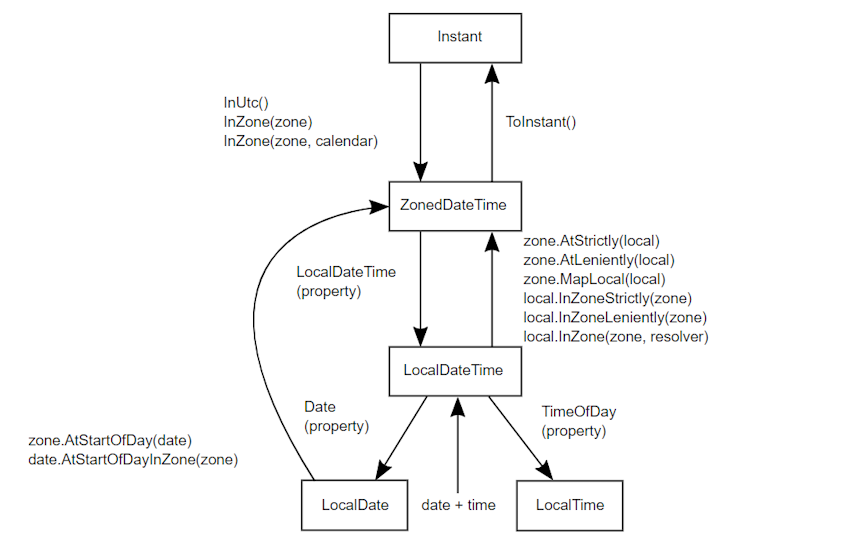NodaTime Vs System.datetime in .NET
Noda Time: What Is It?
An open-source tool called Noda Time makes working with dates in.NET easier. We don’t have to be concerned about the intricate details of time and dates when we use the library. That’s taken care of for us by the library. The library can be used to calculate durations, handle dates, and keep track of events across many time zones.
System and NodaTime.There are two separate date and time libraries in.NET called DateTime, each with a unique set of capabilities and benefits. This is a comparison between System and NodaTime.Time of Date.
NodaTime
- Immutability: The immutability of NodaTime types ensures security in situations involving many threads. An instance’s value cannot be altered after it has been created, which is known as immutability.
- Domain-Driven Design (DDD): NodaTime is suited for modeling intricate date and time scenarios because it was created using the concepts of DDD.
- Time Zones: For precise and current time zone information, NodaTime comes with an extensive time zone database (TZDB). offers assistance with the IANA Time Zone Database.
- Precision: NodaTime offers more accurate time interval, duration, and period representations. allows for precision in nanoseconds.
- Clarity and Safety: NodaTime types reduce ambiguity by clearly differentiating notions such as instant, local date, local time, etc.
- Arithmetic Operations: Provides a range of arithmetic operations to improve computation accuracy.
- Provides support for value converter integration with Entity Framework Core integration.
- NodaTime’s extensibility enables users to design their own date and time formats.
DateTime System
- Changeability: The structure.Due to DateTime’s mutability, improper handling in multithreaded scenarios may cause problems.
- Limited Time Zone Support: Managing time zone-related processes and providing limited support for time zones might be more difficult.
- Precision: Compared to NodaTime, this precision is limited to milliseconds.
- System is clear.In some situations, DateTime might be confusing, particularly when dealing with time zones and daylight-saving adjustments.
- Arithmetic Operations: Accomplishes simple arithmetic operations; however, computations with months and years may not be as accurate.
- Entity Framework Integration: System.DateTime is supported by Entity Framework by default, but conversions may need extra care to account for different time zones.
Considerations
- Use Case: Choose NodaTime for complex date and time scenarios, accurate time zone handling, and improved precision. System.DateTime might be sufficient for simpler scenarios where extensive date and time manipulation is not required.
- Safety and Thread Safety: NodaTime’s immutability provides increased safety, especially in concurrent programming.
- Community and Support: NodaTime has an active community and is actively maintained.
- Migration: If you have existing code using System.DateTime migrating to NodaTime might require careful consideration and testing.
It’s not uncommon for developers to participate in a lot of team conversations about date and time-related issues. I hope to provide some insights on how to make sure that a globally distributed system is properly managing time zones in this blog article. The unpredictable nature of cloud server locations and the unknown local time settings of these servers make this operation very difficult. It also becomes important to deliver date and time information in the user’s local time zone because client access points can differ globally. Although the DateTime construct in C# might be enough for simple situations, it does not have an intuitive user interface to manage intricate time zone manipulations and customizable presentations.
What is DateTime’s primary problem?
For the same reason that Joda Time exists for Java, Noda Time exists for.NET: the built-in libraries are insufficient for handling dates and times. It is difficult to treat the data uniformly since both platforms offer far too few types to represent date and time values in a way that demands the developer think carefully about the type of data they are working with.
What is DateTime’s primary problem?
For the same reason that Joda Time exists for Java, Noda Time exists for.NET: the built-in libraries are insufficient for handling dates and times. It is difficult to treat the data uniformly since both platforms offer far too few types to represent date and time values in a way that demands the developer think carefully about the type of data they are working with.
Although this behavior is configurable, it’s simple to miss and could cause problems. Furthermore, even if that is how it was kept, DateTime objects obtained from EF Core might not define the kind as UTC, which could lead to a number of issues. Some developers in this project employed ToUniversalTime and ToLocalTime, two extension methods that, if not used correctly, can create issues into your program.
System and NodaTime.A two-pronged method for managing date and time in.NET applications is called DateTime. This is a comparison of the types that System and NodaTime offer.Time of Date.
- Instant vs. DateTime
- NodaTime Instant: This represents an instantaneous point on the timeline, typically expressed in terms of ticks since a reference point.
- System.DateTime: Represents a specific point in time, with precision up to milliseconds.
- LocalDate vs. DateTime vs DateOnly
- NodaTime LocalDate: Represents a date without a time component, ensuring a clearer separation between date and time.
- System.DateTime: Contains both date and time, which can lead to ambiguity in some scenarios.
- System.DateOnly: DateOnly is available starting from .NET 6.0; it represents a date without a time component
- LocalTime vs. DateTime vs TimeOnly
- NodaTime LocalTime: This represents a time of day without a date, offering a clearer representation when time is the primary concern.
- System.DateTime: Always includes date information, which may be unnecessary for certain use cases.
- System.TimeOnly: TimeOnly is available starting from .NET 6.0; it represents a time without a date component
- ZonedDateTime vs. DateTime with DateTimeKind
- NodaTime ZonedDateTime: Represents a date and time in a specific time zone, avoiding the pitfalls associated with DateTimeKind in DateTime.
- System.DateTime with DateTimeKind: Uses DateTimeKind to indicate whether the DateTime is expressed in UTC, local time, or unspecified, but it has limitations and can be error-prone.
- OffsetDateTime vs. DateTimeOffset
- NodaTime OffsetDateTime: Represents a date and time with an offset from UTC, ensuring clarity in scenarios involving different offsets.
- System.DateTimeOffset: Similar to OffsetDateTime, but with different methods and considerations.
- LocalDateTime vs. DateTime
- NodaTime LocalDateTime: Represents a date and time without an explicit time zone or offset, providing clarity when time zone information is not essential.
- System.DateTime: Contains both date and time but may lack information about the intended time zone.
- Duration and Period vs. TimeSpan
- NodaTime Duration/Period: Provides separate types for representing time spans and calendar-based periods, preventing confusion between the two.
- System.TimeSpan: This represents a duration, but there’s no dedicated type for calendar-based periods.
- DateTimeZone vs. TimeZoneInfo
- NodaTime DateTimeZone: This represents a time zone, offering better functionality and clarity compared to TimeZoneInfo.
- System.TimeZoneInfo: Provides time zone information but has some limitations.
Converting between types
The following diagram shows various different ways of converting between the types.

Summary
For applications that deal with date and time management in great detail, NodaTime is a great library. NodaTime offers a reliable option whether you’re dealing with different time zones or navigating through situations involving time travel and particular times of day. The decision between NodaTime and System in the end.DateTime is determined by the particular needs of your application as well as the degree of control and precision you demand for date and time operations.
ASP.NET Core 8 Hosting Recommendation
HostForLIFE.eu
HostForLIFE.eu is a popular recommendation that offers various hosting choices. Starting from shared hosting to dedicated servers, you will find options fit for beginners and popular websites. It offers various hosting choices if you want to scale up. Also, you get flexible billing plans where you can choose to purchase a subscription even for one or six months.

